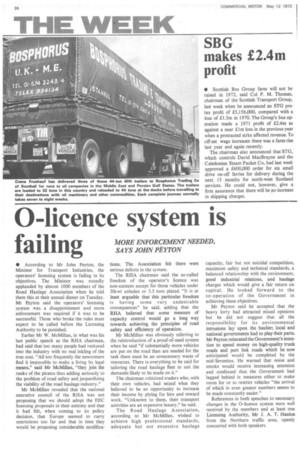0-licence system is
Page 38

If you've noticed an error in this article please click here to report it so we can fix it.
failing MORE ENFORCEMENT 1VEEDED
SAYS JOHN PEYION
• According to Mr John Peyton, the Minister for Transport Industries, the operators' licensing system is failing in its objectives. The Minister was roundly applauded by almost 1000 members of the Road Haulage Association when he told them this at their annual dinner on Tuesday. Mr Peyton said the operators' licensing system was a disappointment and more enforcement was required if it was to be successful. Those who broke the rules must expect to be called before the Licensing Authority to be punished.
Earlier Mr W. McMillan, in what was his last public speech as the RHA chairman, had said that too many people had ventured into the industry with no real inkling of the true cost. "All too frequently the newcomers find it impossible to make a living by legal means," said Mr McMillan, "they join the ranks of the pirates thus adding seriously to the problem of road safety and jeopardizing the viability of the road haulage industry."
Mr McMillan revealed that the national executive council of the RHA was not proposing that we should adopt the EEC licensing proposals in their entirety and that it had felt, when coming to its policy decision, that Europe seemed to carry restrictions too far and that in time they would be proposing considerable modifica
tions. The Association felt there were serious defects in the system.
The RHA chairman said the so-called freedom of the operator's licence was non-existent except for those vehicles under 3Ocwt unladen or 3.5 tons plated. "It is at least arguable that this particular freedom is having some very undesirable consequences" he said, adding that the RHA believed that some measure of capacity control would go a long way towards achieving the principles of road safety and efficiency of operation.
Mr McMillan seas obviously referring to the reintroduction of a proof-of-need system when he said "if substantially more vehicles are put on the road than are needed for the task there must be an unnecessary waste of resources. There is everything to be said for tailoring the road haulage fleet to suit the demands likely to be made on it."
The chairman criticized traders who, with their own vehicles, had seized what they believed to be an opportunity to increase their income by plying for hire and reward work. "Unknown to them, their transport activities are an expensive luxury," he said..
The Road Haulage Association, according to Mr McMillan, wished to achieve high professional standards, adequate but not excessive haulage
capacity, fair but not suicidal competition, maximum safety and technical standards, a balanced relationship with the environment, good industrial relations, and haulage charges which would give a fair return on capital. He looked forward to the co-operation of the Government in achieving these objectives.
Mr Peyton said he accepted that the heavy lorry had attracted mixed opinions but he did not suggest that all the responsibility for its environmental intrusions lay upon the haulier; local and national governments had to play their parts. Mr Peyton reiterated the Government's intention to spend money on high-quality trunk roads and port link roads which he now anticipated would be completed by the mid-Seventies. He warned that noise and smoke would receive increasing attention and confessed that the Government had lagged behind in measures either to make room for or to restrict vehicles "the arrival of which in even greater numbers seems to be made constantly easier."
References in both speeches to necessary changes in the 0-licence system were well received by the members and at least one Licensing Authority, Mr J. A. T. Hanlon from the Northern traffic area, openly concurred with both speakers.
















































































































































































































